High Payoff Scenes.
High Payoff Scenes.
If that scene you meant to be emotional, jaw-dropping and climactic isn’t working right, try taking a step back.
All the usual aspects of a good scene also apply to the buildup toward a good scene. As well as including all these aspects into the scene itself, remember that at the point where your awe inspiring scene hits…
The reader should already feel deep, ‘positive’ emotions for the characters involved, whether that be love, intrigue, or an I love to hate them feeling.
The reader should already understand and have witnessed the characters struggling in some way with the goals they are working towards during that scene.
The reader should already have a clear picture of the character’s relationships and emotions, and understand which direction they are moving.
The reader should already be well-based in the plot and have a good understanding of every piece of information they need order to be fully immersed in the scene.
The reader should already have a clear picture of the current stakes and playing field, so they can decide what outcome to root for. (Or in some cases, they can feel the same desperation the pov character has as they realize there are no good outcomes.)
Most importantly, remember that there are no perfect first drafts, and barely any half-decent second, third, or fourth drafts either. If you need to rewrite and rewrite a few times over, that’s okay.
Just because the amazing scene in your head seems to fall short once it’s written, doesn’t mean all its amazingness isn’t still buried in there somewhere.
More Posts from Risingstarling and Others

Know your bricks!
Ten things that are ok, even good, to eat before you sing
Water – You should be drinking lots of this. It shouldn’t be optional. Singers need to drink water.
Raw fruit – Excellent source of good energy. Think of fruit as a healthy sugar rush.
Steamed or raw veggies – If you’re hungry before a show, raw veggies will give you a healthy, “full” feeling without slowing you down. You don’t want to be distracted by hunger when singing, but you don’t want to overeat either.
Warm tea and honey – Not too hot, though. Hot tea is bad. Let it sit for 5 minutes before taking a sip.
Salad with oil and vinegar – Same as #3, but stay away from dairy-based salad dressings as diary is not good before a performance.
Chicken breast with a side of steamed veggies – If you absolutely need to have a meal before a performance, this is OK. But eat until you are no longer hungry. DON’T eat until you’re full! The “full” feeling is not helpful to singers.
Omelet (no cheese) or a hard boiled egg – Good if you need a protein boost.
Warm, broth-based soup -- As opposed to cream-based soup. Can’t stress enough that singers should stay away from dairy until AFTER a show.
Salmon (or a light fish) and veggies – See #6.
Water – Yes, it’s so important that I needed to put it in this list twice!
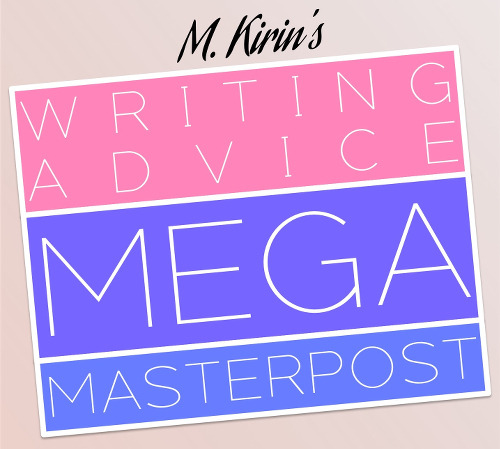

Hello, writerly friends~ ♥︎
You asked for a Writing Advice Masterpost, so here it is! Below you will find a collection of the best questions and answers from the last two years. Not only that, but they are also organized so you can find the answers to your questions quickly and get on with writing.
But wait, there is more!
This post is more than just a collection of advice, it’s a nexus for writing advice, resources, and information! That’s right, this post is going to grow over time. I will be updating this masterpost WEEKLY with new answers, writing advice videos, playlists, and more! So, make sure to bookmark this page and follow my blog (maxkirin.tumblr.com) so you don’t miss a thing~ ♥︎
Writing Advice Compilations
WRITERS UNITE! A book of writing advice, inspiration, and tips! Written with the help of 248 Tumblr authors. FREE DOWNLOAD!
Prompts
Daily Story Seed
Daily Weird Prompt
Daily Character Question
Your Writing Horoscope (Retired)
“Can I publish a story based on one of your prompts?”
Youtube Videos!
Virtual Writing Academy, a weekly writing class where we explore strange writing exercises. This is NOT a lecture. You are not going to learn by listening— but by WRITING. So, take out your notebooks because we are going to write! New episodes go up every Wednesday.
Writing Advice Blitz, a segment where I answer YOUR writing questions. New episodes go up every Monday.
Writing Challenges— prompts too easy for you? Looking for a challenge? YOU GOT IT. These challenges will push your writing skills to the limit! New episodes go up every Friday.
Motivation & Inspiration
Daily Writer Positivity
How to Finish Your First Novel (M. Kirin’s Origin Story)
What Confidence Is and Is NOT
How to Regain the Motivation to Finish That Book
“I’m afraid writing is a waste of time”
“I’m half-way through this book and I’m stuck”
Stop Trying to Impress People
Stop Trying to Make Your Parents Proud of your Writing
Your Parents Disapprove of Your Writing?
You’re Not The Worst Writer In The World
English Not Your First Language? Neither is Mine
A Tip for All Young Writers Worrying That Nobody Will Take Them Seriously
Dealing with Hate and Harsh Criticism
You Need to Develop a Thick Skin
Neil Gaiman’s “Make Good Art” Speech
Feeling Down About Your Writing? :c
Elizabeth Gilbert’s Inspirational Speech on the ‘Genius’
Neil Gaiman’s 8 Rules of Writing
“I am not as good as other writers” (and other lies)
The 7 Cardinal Rules of Writing Life
Be A Little Delusional
Planning, Outlining, and Getting Started
M. Kirin’s (Strange) Guide to Planning Your Novel
M. Kirin’s Click-n-Drag Story Generator
Which outlining method is the best? (Video)
“I want to write a book but I have no idea where to start”
The Story-Idea Test
M. Kirin’s Secret for Starting books, and Finishing Them
M. Kirin’s Top 3 Tips to Start Writing and Never Stopping
The 10-Minute Writing Trick
Tips for writing Science Fiction, Fantasy, and Paranormal
How Much Worldbuilding is Enough?
M. Kirin’s #1 Tip For Improving Your Writing
Let’s Talk About: Show VS Tell
The Difference Between Character & Plot (The Marcy Rule)
Dialogue
M. Kirin talks about authentic dialogue
The grammatical side of dialogue
How do I write numbers in dialogue?
Editing & Revision
M. Kirin’s Top 5 Revision Tips
How to Love and Care for Your Beta Readers
M. Kirin’s (subjective) secret recipe for the second draft
When is the best time to edit a story?
M. Kirin Talks About Editing, and Speeding Up Your Story
M. Kirin Uses Evernote to Revise Books
“Kill Your Darlings” VS “Cut What You Love”
Writing Killer Plot-Twists and Mystery Novels
“How long is a Rough Draft compared to the Finished Draft?”
Hot Button Issues
Realism is a dirty word
Racist & homophobic language in fiction
Inaccuracy in Fiction (Video)
M. Kirin drops a few bombs on ‘creative vocabulary’
“I want to write but I don’t have the time”
Is it bad to have too many LGBTQIA or POC characters?
“My antagonist is POC/LGBTQIA, is this bad?”
“All my characters are LGBTQIA, is this bad?”
When to let go of a story
Is it rational to be afraid of what people will think of you?
Let’s Talk About: Deus Ex Machina
Let’s Talk About: Coincidence in Writing
Let’s Lightly Talk About: Plagiarism & Copyright
Writing About Things You Have Never Experienced
“Do you need to go to college/university to be a good writer?”
My book is similar to something already out, what do I do?
General Advice
M. Kirin’s Cure For Writer’s Block (and Life Block)
Overcoming the First Sentence
Overcoming the First Sentence, Again
Overcoming the First Sentence, Redux
The 10-Minute Rule
Making Boring Scenes FUN to Write!
Stories are like children
Let’s Talk About Titles (And Then Talk Some More)
M. Kirin Reveals the ‘Secret’ Behind Style
How much description/scenery is too much?
How can I write faster?
I want my readers to love my characters
I think my book may be too short for my genre
My story doesn’t have an Antagonists, should I add one?
I killed one of my main characters by mistake, what do I do?
M. Kirin’s Writing Advice for Fleshing out Romantic Relationships
A warning about character names and meanings
Help! My characters are not doing what I expected them to!
Help! My characters are misbehaving! D:
A warning about character sheets
A talk about the beauty of first drafts, and pacing
Is getting attached to your characters… bad?
A note on Antagonism, and whether you need a villain or not
Past or present tense?
Is swearing okay? And other muthafuckin’ truths
“What emotion do you find hardest to write?”
“What writing software do you use?”
Communication, a must for collaborative works
Researching illegal things, cousin? I got just the thing for you!
Joss Whedon’s Top 10 Writing Tips
M. Kirin’s Tarot Cheat-Sheet
Writing Tips for Storytelling in Video-Games
Fair Use In Novels (by thedancingwriter)
Let’s Talk About: Pen Names!
Let’s Talk About: Reactive VS Proactive Characters
Let’s Talk About: Transitioning Smoothly From Scene to Scene
Let’s Talk About: Writing The Climax (& Resolution)
Let’s Talk About: Writing The End
Let’s Talk About: Spies
Let’s Make a Title (To A Story You Haven’t Finished)
Publishing
Publishing Battle: Indie VS Traditional
“How do I turn my book into an eBook?”
Writing Music & Playlists
Writing In The Dark (Relaxing, Unobtrusive)
Writing About Love (All the Feels)
Writing & Fighting! (Super Intense!)
Writing About Horror (Welcome to Lavender Town)
Royalty And Noble Blood (Medieval Writing Playlist)
Digital Reality (Cyberpunk/Futuristic Playlist)
Lost In The Wild (Survival/Nature Playlist)
No Hero (Danger, Action, and Anti-Heroes!)
Mermaid Magic (Sunken Cities, Sea Monsters, and Magic!)
After The Bomb (Post-Apocalyptic and Dystopian)
Sorrow (Death, Grief, and Despair)
Music For Writers: Portal 2 Soundtrack (FREE)
M. Kirin’s Writing Playlists: Ravensgem
M. Kirin’s Writing Playlists: Justine’s Blood
M. Kirin’s Favorite Music to Listen to While Writing
M. Kirin’s Secret For Making Playlists
Miscellaneous
Finally! An Ask-Meme for Writers!
M. Kirin’s Philosophy for Running a Writing Blog
Last Updated: 10-04-14. Click HERE to see the latest update. Latest posts are in Italics.



Cat Behavior








Sailor Moon Meme Question 16:
Favourite Movie:
IT WOULD TAKE 30,000 NOVELS TO FULLY EXPRESS JUST HOW MUCH I LOVE THE R MOVIE YOU DON’T EVEN KNOW
Like seriously I had to think hard to find a scene I haven’t already made a gif(set) of. I love this movie so, so, so, so much. I love this scene so, so, so, so much. I LOVE THE R MOVIE.
…
*ahem* I mean, the R movie is okay I guess…

My worst fear on a test? The feeling of getting an exam paper in front of me, and not being able to remember anything, while back at home when reading the book I thought I knew everything. Sounds familiar? In that case, it may help to try these techniques. They help you practice retrieving information, rather than being familiar with the concepts you are studying. These have helped me loads, and I’m actually pretty convinced that these techniques are better than many others I used to apply, like rereading and regular summarizing. Hopefully they work for others as well :)
1. Summarise… in questions.
How do you do it? Instead of writing down facts, you convert facts to questions. Underneath the these, you answer them in your own words. This is technically the baby of summaries and flashcards. Don’t do this with every small fact, but rather convert several to one question, and omit the less important things always. You’re not going to remember every detail and most teachers don’t require you to (of course if they do, study them lol) .
Why would you do it? It is proven that asking yourself questions about the material enhances understanding and remembrance. Additionally, you can instantly quiz yourself on the material. Only reading your summary is not going to help you much with remembering, but actively retrieving information is! Also, when you’re reading and summarising the textbook throughout the semester, you’re already getting your study material for the test ready => less stress and work for when you gotta study.
2. Teach your peer / pet / pillow
How do you do it? Explain key concepts (many books provide these at the beginning or end of the chapter) to anyone who wants to listen. Don’t have anyone who wants to? Your cat probably won’t mind (but who knows what cats want tbh) and your reflection is always listening to you as well.
Why would you do it? Explaining things to other people requires you to really understand what you are talking about, and you will more quickly find holes in your knowledge once you’re not able to explain it. Additionally, you’re probably gonna have to explain stuff on tests so it’s good practice.
3. Re-do your homework
How do you do it? Pretty obvious. Well, don’t write every answer down in detail again! For maths it may be useful to only tackle the most important exercises again, while for history you may want to spend an hour to just go over them all and test in your head if you can form a sensible answer.
Why would you do it? Going over the homework is always a good idea because 1) the theory is practically applied in those questions, so you have to think about what you have learned, enhancing integration, and 2) teachers are lazy and will often reuse or slightly modify textbook questions.
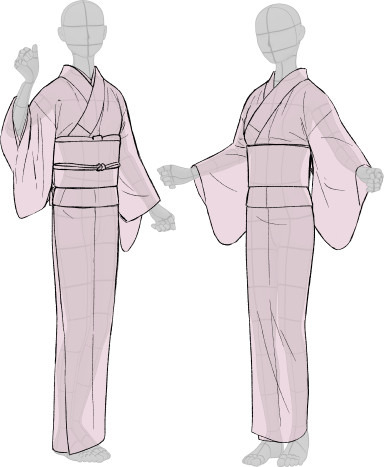


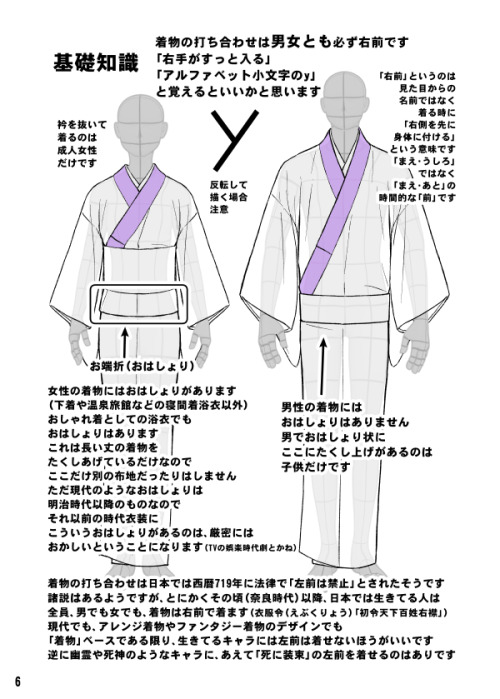
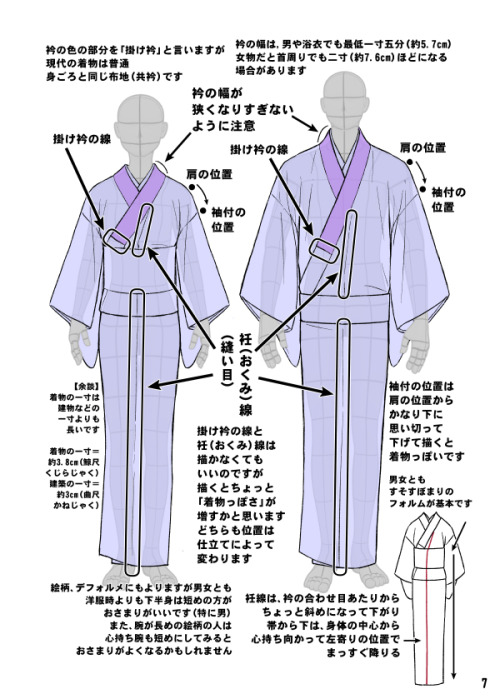
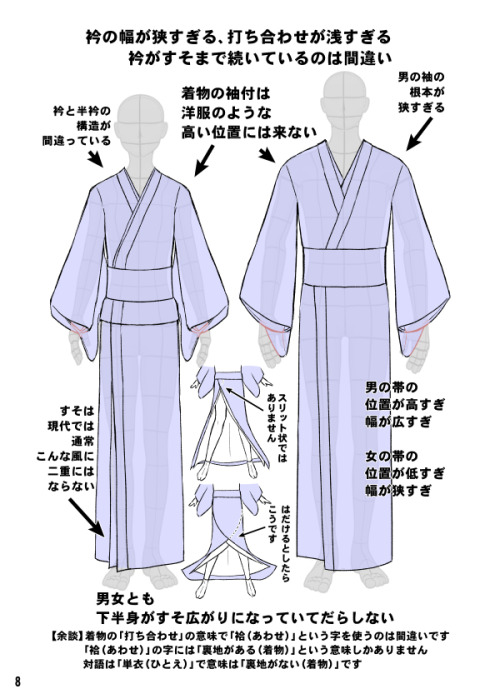
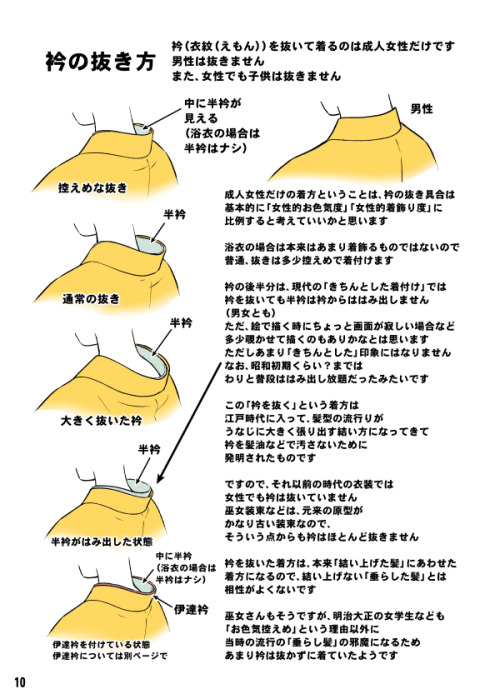

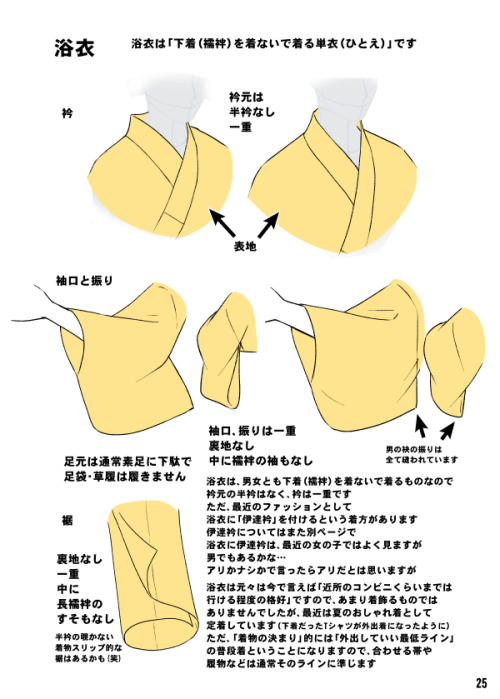

Kimono drawing guide ½, by Kaoruko Maya (tumblr, pixiv, site). Booklet is available in pdf for ¥ 900 here.
Here you can see:
female kimono and yukata (note how the juban underwear peeks when in kimono + how belts differ)
male yukata and kimono (note how the juban underwear peeks when in kimono)
dressing up: male (kimono is not closed yet) and female (kimono closed with datejime belt and ready to put on obi)
differences between female and male kimono once dressed (note how the collars and belts set)
common drawing mistakes (compare with previous picture: shoulders lines are too defined, there is a double hem, collars are narrow, belt is not at the right place etc)
women back collar (the lower the sexier) and men back collar (close to the nape)
back and sleeves differences between men and women
collars and sleeves and view of how kimono drapes around body
Furisode back (long sleeves kimono) and formal furisode obi knot example
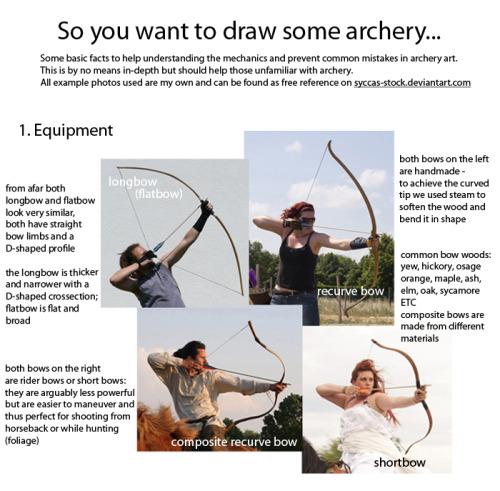
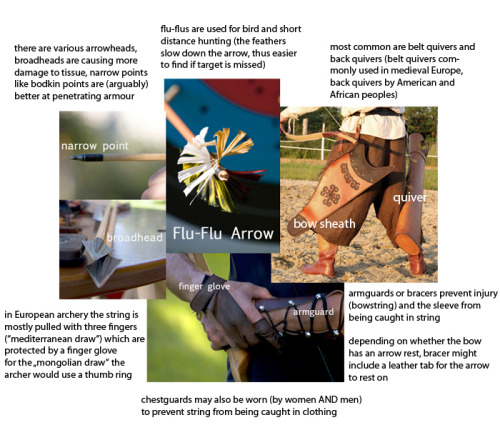
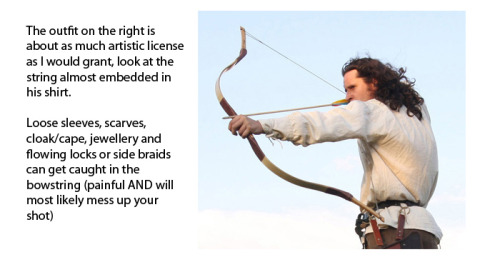
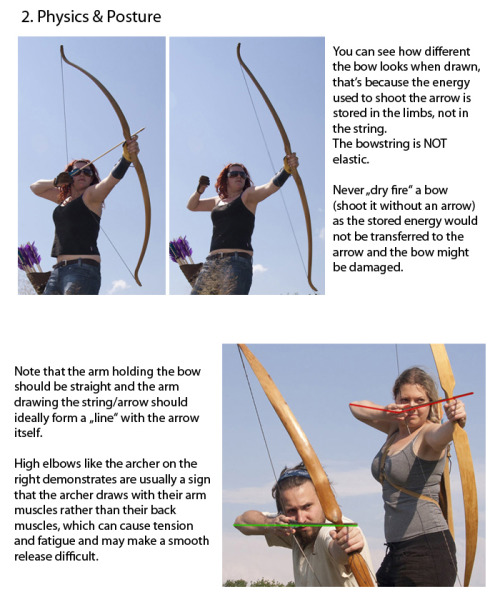

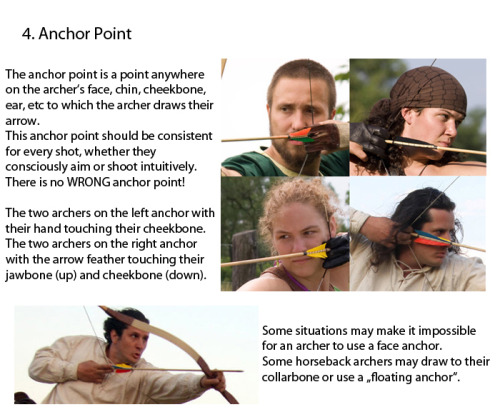
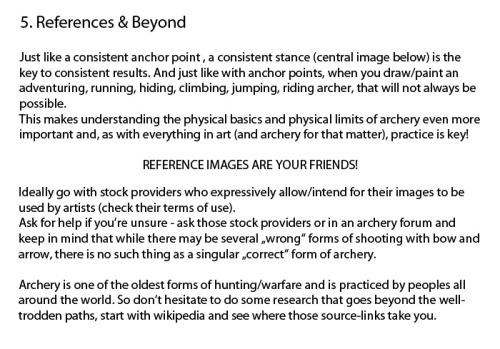
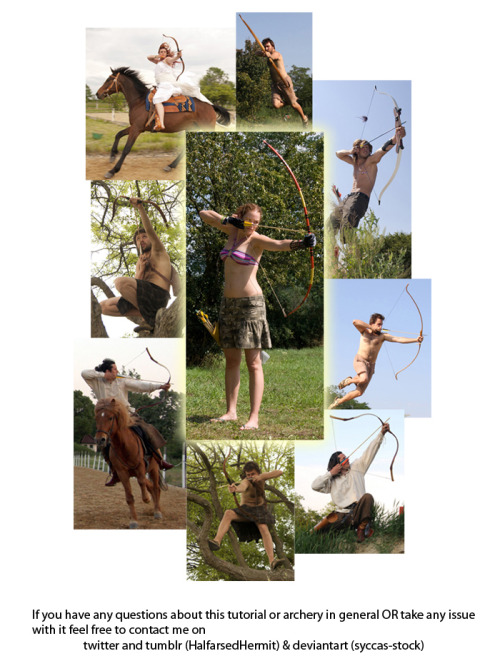
Spent the last two days working on this little archery guide in art and writing. Considering the rise in popularity of archers in pop culture this hopefully comes in handy for a bunch of fandoms.

Body Language Is More Revealing Than Words: How to Read People More Clearly
Our bodies can often be more honest than our words when it comes to communicating our thoughts, feelings, and intentions.
When we choose what to say, we’re often using the executive parts of our brains (the “neocortex”). This part of the brain is responsible for conscious attention, language, and thinking, all of which we have a degree of control over with some effort.
Because we have a choice in what we say, this makes it easier to conceal, deceive, and lie with our words.
However, we don’t usually choose our body language, which comes from the automatic parts of our brains (the “limbic system”). This part of the brain is responsible for our emotions, instincts, and gut reactions, all of which we don’t normally have control over.
According to What Every Body Is Saying: An Ex-FBI Agent’s Guide to Speed-Reading People, because our body language is more automatic than our speech, this makes it harder to conceal, deceive, and lie about our true thoughts and feelings through our bodies.
Therefore, if you want to learn how to better read people and understand what’s going on inside their minds, you need to listen more to what their bodies are communicating to you. Especially if it doesn’t match up with what they are saying.
Most of us know how to choose our words carefully. We are taught from an early age how to act polite and kind even when we don’t want to – or how to tell a harmless lie to protect someone’s feelings (“Thanks for the birthday gift! I always wanted socks!”)
However, we don’t often pay attention to what our body language is communicating. And because it happens automatically without us deliberately choosing, it’s harder to override how our body responds to a situation. Our bodies rarely lie.
In this article, I will share basic guidelines on what to look for in body language. This can also be a valuable resource in learning what your own body is communicating to others, perhaps without you even realizing it.
Click here to read more







-
 a-storm-of-nightengales liked this · 2 months ago
a-storm-of-nightengales liked this · 2 months ago -
 newdawnhorizon reblogged this · 4 months ago
newdawnhorizon reblogged this · 4 months ago -
 rinarelli liked this · 5 months ago
rinarelli liked this · 5 months ago -
 goddessofcoloredpencils liked this · 6 months ago
goddessofcoloredpencils liked this · 6 months ago -
 separateentity liked this · 8 months ago
separateentity liked this · 8 months ago -
 kjsupernova liked this · 8 months ago
kjsupernova liked this · 8 months ago -
 julevanwilde reblogged this · 8 months ago
julevanwilde reblogged this · 8 months ago -
 writerblocker reblogged this · 9 months ago
writerblocker reblogged this · 9 months ago -
 kormantic reblogged this · 1 year ago
kormantic reblogged this · 1 year ago -
 kormantic liked this · 1 year ago
kormantic liked this · 1 year ago -
 zingiber-santi reblogged this · 1 year ago
zingiber-santi reblogged this · 1 year ago -
 zingiber-santi liked this · 1 year ago
zingiber-santi liked this · 1 year ago -
 writeywritey reblogged this · 1 year ago
writeywritey reblogged this · 1 year ago -
 junglekarmapippa reblogged this · 1 year ago
junglekarmapippa reblogged this · 1 year ago -
 jkpippawrite reblogged this · 1 year ago
jkpippawrite reblogged this · 1 year ago -
 heckcareoxytwit liked this · 1 year ago
heckcareoxytwit liked this · 1 year ago -
 thepoetjean-makes-stuff liked this · 1 year ago
thepoetjean-makes-stuff liked this · 1 year ago -
 somewhereinthewoodsalone liked this · 1 year ago
somewhereinthewoodsalone liked this · 1 year ago -
 octopusknowledgehorde reblogged this · 1 year ago
octopusknowledgehorde reblogged this · 1 year ago -
 terri-fic-tess liked this · 1 year ago
terri-fic-tess liked this · 1 year ago -
 ilovedtoomuchdidnti liked this · 1 year ago
ilovedtoomuchdidnti liked this · 1 year ago -
 taaroko liked this · 1 year ago
taaroko liked this · 1 year ago -
 hydrangeahelper reblogged this · 1 year ago
hydrangeahelper reblogged this · 1 year ago -
 taiclicatec liked this · 1 year ago
taiclicatec liked this · 1 year ago -
 uncontrollablemuse liked this · 1 year ago
uncontrollablemuse liked this · 1 year ago -
 thoughtful-archivist reblogged this · 1 year ago
thoughtful-archivist reblogged this · 1 year ago -
 thatharringrovehoe liked this · 1 year ago
thatharringrovehoe liked this · 1 year ago -
 write-101 reblogged this · 1 year ago
write-101 reblogged this · 1 year ago -
 wrath-of-medea liked this · 1 year ago
wrath-of-medea liked this · 1 year ago -
 write-101 reblogged this · 1 year ago
write-101 reblogged this · 1 year ago -
 variablecemetery liked this · 1 year ago
variablecemetery liked this · 1 year ago -
 aaustinwrites reblogged this · 1 year ago
aaustinwrites reblogged this · 1 year ago -
 martialwriter liked this · 1 year ago
martialwriter liked this · 1 year ago -
 sunstonedragons reblogged this · 2 years ago
sunstonedragons reblogged this · 2 years ago -
 shoheisehun liked this · 2 years ago
shoheisehun liked this · 2 years ago -
 newdawnhorizon reblogged this · 2 years ago
newdawnhorizon reblogged this · 2 years ago -
 audreycecilemoore reblogged this · 2 years ago
audreycecilemoore reblogged this · 2 years ago
Right now this is just anything that comes to mind since I'm a complete noob at tumblr. I've been hearing about it for years but I never really felt like I had anything to say. Well all that has changed now and I figured I'd see what all the hype about tumlr is really about. Anyway don't take anything I say too seriously for now...I'll probably change it later when I become more comfortable with this website.
168 posts